Hyundai i30 Wagon vs Toyota Yaris - Differences and prices compared
Costs and Efficiency:
Price and efficiency are often the first things buyers look at. Here it becomes clear which model has the long-term edge – whether at the pump, the plug, or in purchase price.
Toyota Yaris has a slightly advantage in terms of price – it starts at 21900 £, while the Hyundai i30 Wagon costs 24800 £. That’s a price difference of around 2991 £.
Fuel consumption also shows a difference: Toyota Yaris manages with 3.80 L and is therefore clearly more efficient than the Hyundai i30 Wagon with 5.70 L. The difference is about 1.90 L per 100 km.
Engine and Performance:
Power, torque and acceleration are the classic benchmarks for car enthusiasts – and here, some clear differences start to show.
When it comes to engine power, the Toyota Yaris has a convincingly edge – offering 280 HP compared to 140 HP. That’s roughly 140 HP more horsepower.
In acceleration from 0 to 100 km/h, the Toyota Yaris is clearly quicker – completing the sprint in 5.50 s, while the Hyundai i30 Wagon takes 9.80 s. That’s about 4.30 s faster.
In terms of top speed, the Toyota Yaris performs to a small extent better – reaching 230 km/h, while the Hyundai i30 Wagon tops out at 197 km/h. The difference is around 33 km/h.
There’s also a difference in torque: Toyota Yaris pulls clearly perceptible stronger with 390 Nm compared to 253 Nm. That’s about 137 Nm difference.
Space and Everyday Use:
Whether family car or daily driver – which one offers more room, flexibility and comfort?
Seats: offers more seating capacity – vs .
In curb weight, Toyota Yaris is distinct lighter – 1090 kg compared to 1316 kg. The difference is around 226 kg.
In terms of boot space, the Hyundai i30 Wagon offers significantly more room – 602 L compared to 286 L. That’s a difference of about 316 L.
In maximum load capacity, the Hyundai i30 Wagon performs convincingly better – up to 1650 L, which is about 715 L more than the Toyota Yaris.
When it comes to payload, Toyota Yaris hardly perceptible takes the win – 525 kg compared to 524 kg. That’s a difference of about 1 kg.
Who wins the race?
The Toyota Yaris proves to be is largely superior and therefore becomes our DriveDuel Champion!
Toyota Yaris is the better all-rounder in this comparison.
 @ Toyota Motor Corporation
@ Toyota Motor Corporation
Toyota Yaris
Costs and Consumption
View detailed analysis
Engine and Performance
View detailed analysis
Dimensions and Body
View detailed analysis
Hyundai i30 Wagon
The Hyundai i30 Wagon is a practical family hauler that pairs roomy, sensible packaging with clean, modern lines and a surprisingly composed chassis. Comfortable, well-equipped and priced to make rivals sweat, it quietly ticks the boxes for daily life and weekend escapes while still managing a little grin on twisty roads.
details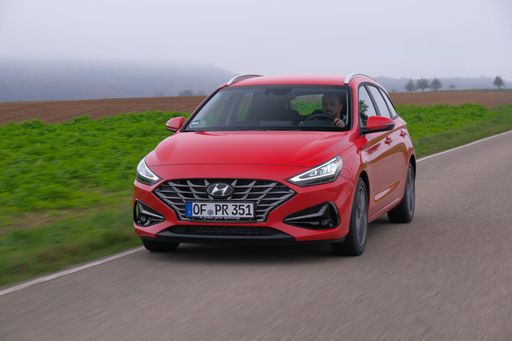 @ Hyundai Motor Company
@ Hyundai Motor Company
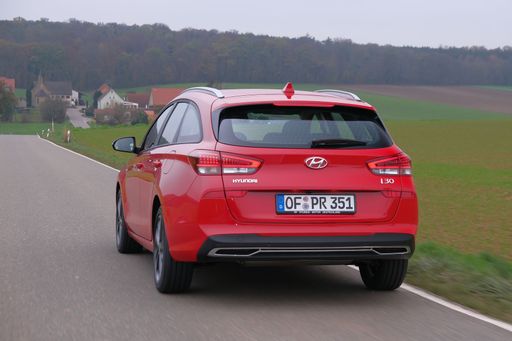 @ Hyundai Motor Company
@ Hyundai Motor Company
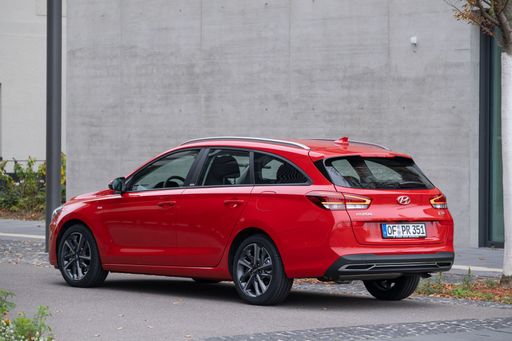 @ Hyundai Motor Company
@ Hyundai Motor Company
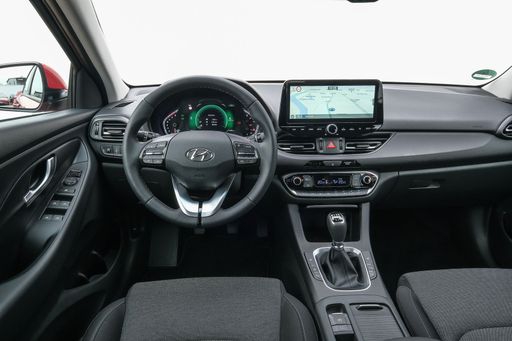 @ Hyundai Motor Company
@ Hyundai Motor Company
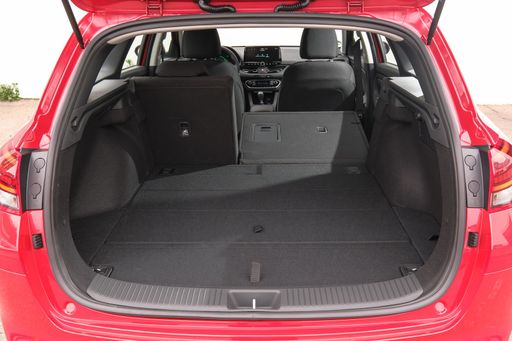 @ Hyundai Motor Company
@ Hyundai Motor Company
Toyota Yaris
The Toyota Yaris is a sprightly city hatch that packs clever packaging, surprising comfort and fuel-sipping manners into a neat, easy-to-park package. It rewards sensible buyers with low running costs, friendly ergonomics and a forgiving drive, delivered with Japanese reliability and just enough personality to make errands feel a little less ordinary.
details @ Toyota Motor Corporation
@ Toyota Motor Corporation
 @ Toyota Motor Corporation
@ Toyota Motor Corporation
 @ Hyundai Motor Company
@ Hyundai Motor Company
|
 @ Toyota Motor Corporation
@ Toyota Motor Corporation
|
|
|
|
Costs and Consumption |
|
|---|---|
|
Price
24800 - 30100 £
|
Price
21900 - 46700 £
|
|
Consumption L/100km
5.7 - 6 L
|
Consumption L/100km
3.8 - 9.5 L
|
|
Consumption kWh/100km
-
|
Consumption kWh/100km
-
|
|
Electric Range
-
|
Electric Range
-
|
|
Battery Capacity
-
|
Battery Capacity
-
|
|
co2
130 - 136 g/km
|
co2
87 - 215 g/km
|
|
Fuel tank capacity
50 L
|
Fuel tank capacity
36 - 50 L
|
Dimensions and Body |
|
|---|---|
|
Body Type
Estate
|
Body Type
Hatchback
|
|
Seats
5
|
Seats
4 - 5
|
|
Doors
5
|
Doors
3 - 5
|
|
Curb weight
1316 - 1461 kg
|
Curb weight
1090 - 1356 kg
|
|
Trunk capacity
602 L
|
Trunk capacity
141 - 286 L
|
|
Length
4585 mm
|
Length
3940 - 3995 mm
|
|
Width
1795 mm
|
Width
1745 - 1805 mm
|
|
Height
1475 mm
|
Height
1455 - 1500 mm
|
|
Max trunk capacity
1650 L
|
Max trunk capacity
935 L
|
|
Payload
439 - 524 kg
|
Payload
289 - 525 kg
|
Engine and Performance |
|
|---|---|
|
Engine Type
Petrol, Petrol MHEV
|
Engine Type
Full Hybrid, Petrol
|
|
Transmission
Manuel, Automatic
|
Transmission
Automatic, Manuel
|
|
Transmission Detail
Manual Gearbox, Dual-Clutch Automatic
|
Transmission Detail
CVT, Manual Gearbox, Automatic Gearbox
|
|
Drive Type
Front-Wheel Drive
|
Drive Type
Front-Wheel Drive, All-Wheel Drive
|
|
Power HP
100 - 140 HP
|
Power HP
116 - 280 HP
|
|
Acceleration 0-100km/h
9.8 - 13.3 s
|
Acceleration 0-100km/h
5.5 - 9.7 s
|
|
Max Speed
178 - 197 km/h
|
Max Speed
175 - 230 km/h
|
|
Torque
172 - 253 Nm
|
Torque
390 Nm
|
|
Number of Cylinders
3 - 4
|
Number of Cylinders
3
|
|
Power kW
74 - 103 kW
|
Power kW
85 - 206 kW
|
|
Engine capacity
998 - 1482 cm3
|
Engine capacity
1490 - 1618 cm3
|
General |
|
|---|---|
|
Model Year
2024
|
Model Year
2024 - 2025
|
|
CO2 Efficiency Class
D, E
|
CO2 Efficiency Class
B, G
|
|
Brand
Hyundai
|
Brand
Toyota
|
What drivetrain options does the Hyundai i30 Wagon have?
Available configurations include Front-Wheel Drive.
The prices and data displayed are estimates based on German list prices and may vary by country. This information is not legally binding.
